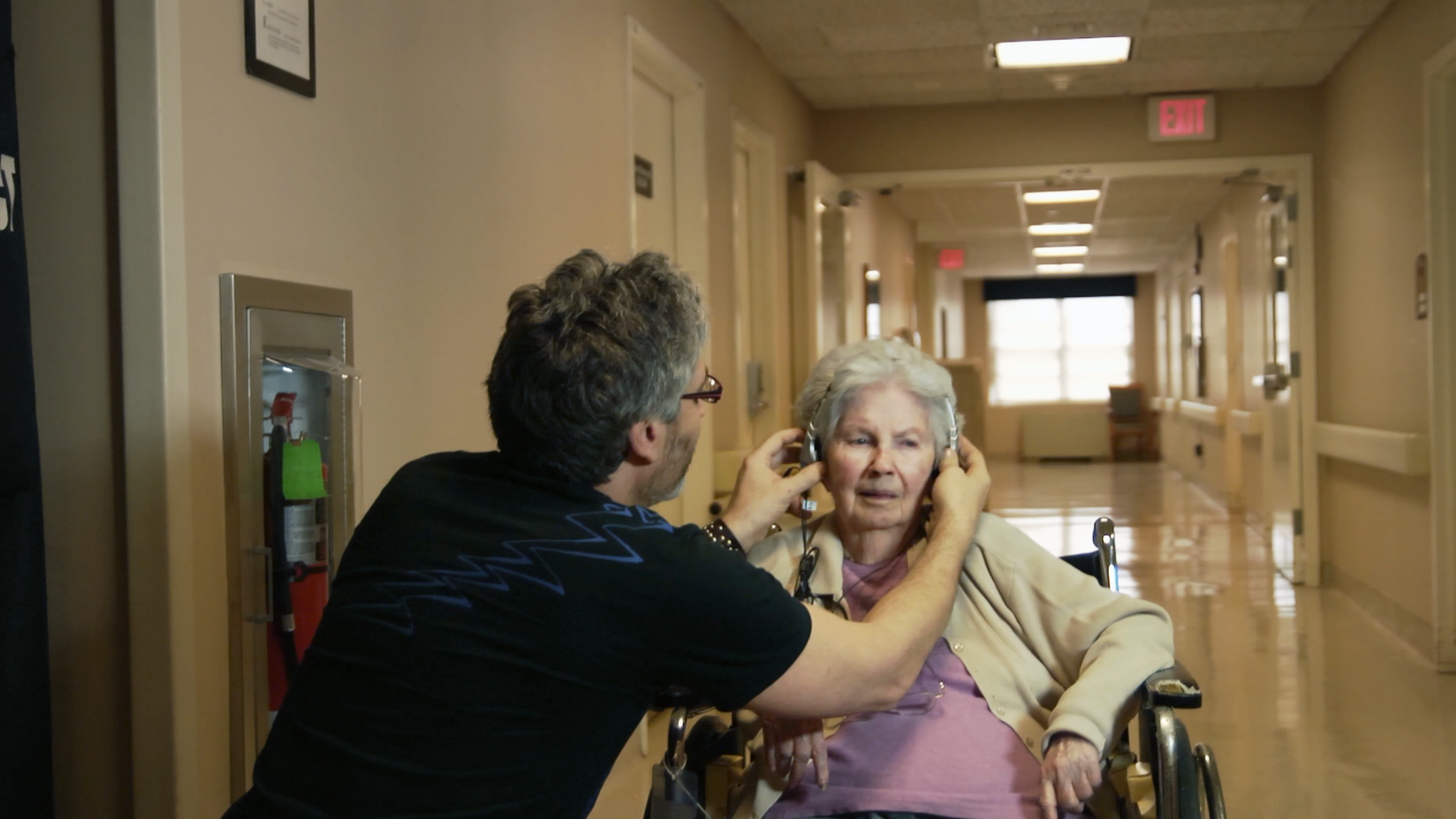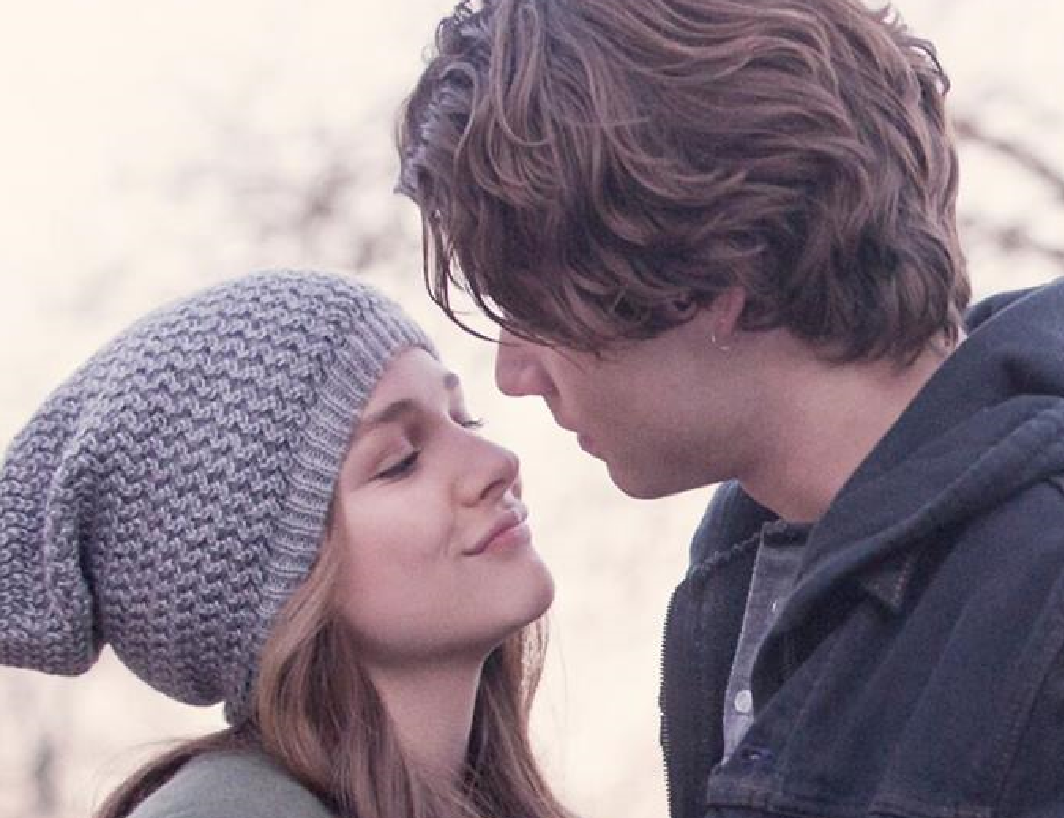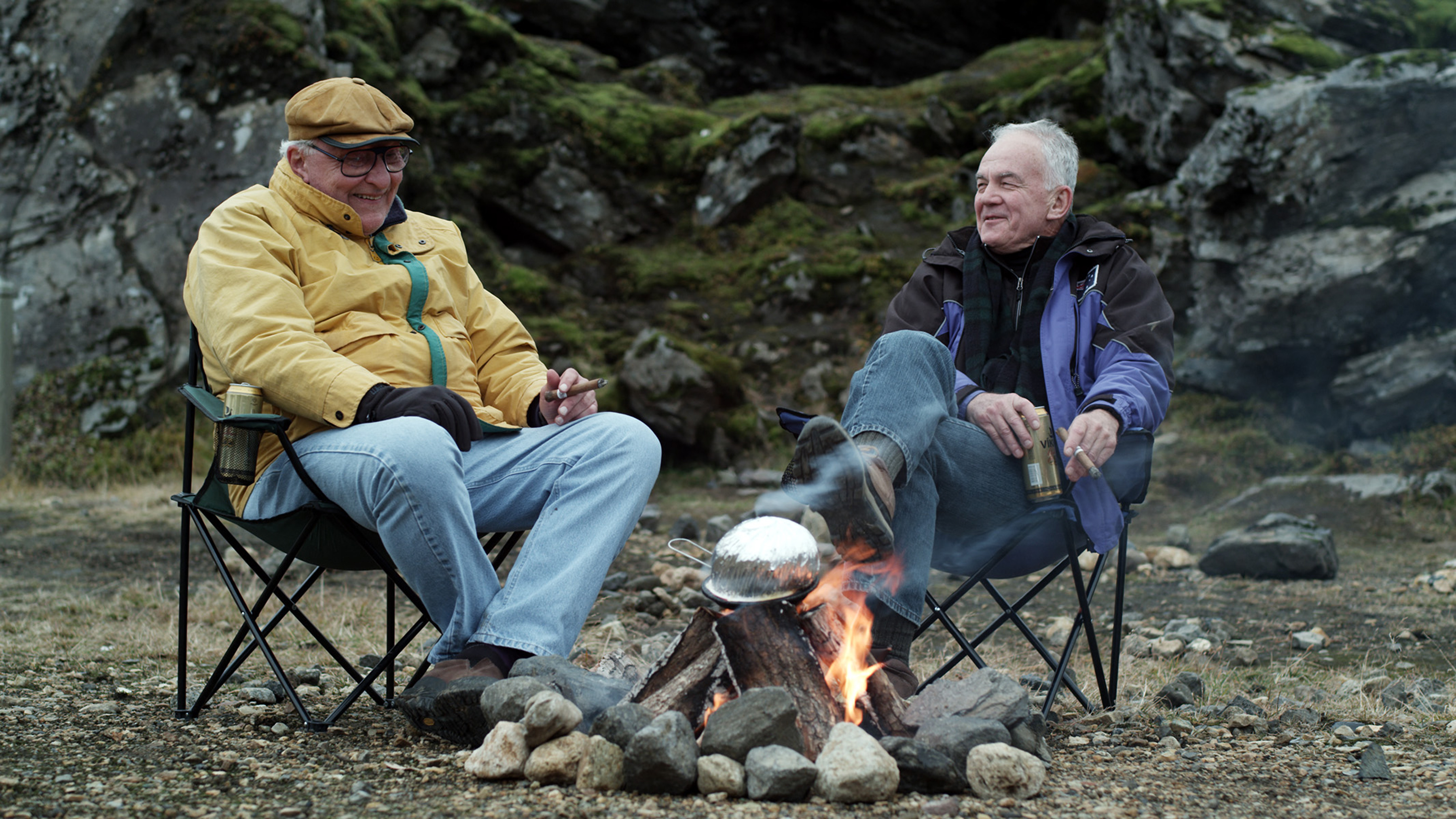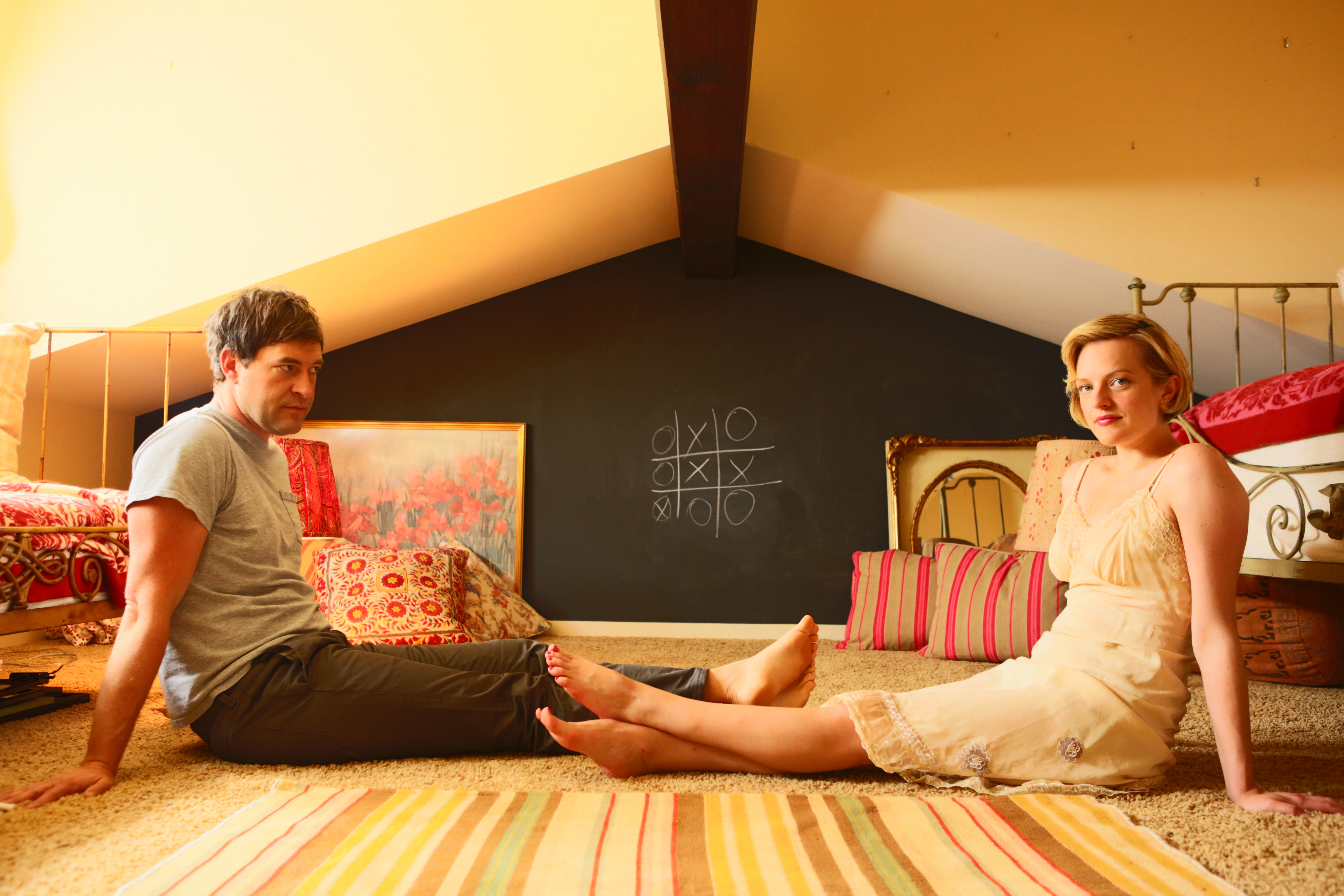VeeShapeOpening ThisWeek
VeeShape
VeeShapePAlive Inside
VeeShapeOpens Fri., Aug. 22 at Varsity. Not rated. 75 minutes.
VeeShapeEverything you always suspected about music is true. Scientists can point to the parts of the brain that music stimulates, where our deepest memories and feelings reside. The phenomenon even stretches back to before birth, when the sound of a heartbeat establishes our sensory proclivity toward music. This scientific material is offered in Alive Inside to buttress the rather remarkable anecdotal evidence we see for ourselves onscreen, as the power of music is used to revive the personalities of people with dementia and Alzheimer’s disease. Filmmaker Michael Rossato-Bennett tags along with Dan Cohen, a music-therapy proselytizer (and founder of the nonprofit Music & Memory), as Cohen travels to facilities for people living with dementia.
VeeShapeCohen’s method is frequently repeated here, but never wears out its welcome. He approaches people whose memory loss has put them in a dulled or lethargic state and invites them to listen to music from an iPod shuffle. When a song begins, the change is almost immediate: Eyes light up, limbs begin twisting, and stories pour out. If it isn’t a definitive argument in favor of using music as a therapeutic tool, it’s certainly dramatic. The film then goes on to lobby in favor of getting such therapies into hospitals and retirement communities, painting a dire portrait of a pharmaceutical-industrial complex that delights in ringing up thousands of dollars of drugs for patients every month but balks at a $40 iPod. Serious establishment voices are not much heard here, but then this isn’t really a documentary—it’s a work of activism, and a beautiful one. If Alive Inside helps change the culture of treatment for the cognitively impaired, that would be a very good thing.
It becomes more than activism, too. Seeing the joyful transformation that erupts when an Alzheimer’s patient hears the Beach Boys’ “I Get Around” suggests we might need to re-evaluate the generally accepted hierarchy of Important Things in Life. Material success and adult accomplishments are all well and good, but maybe we should pay attention to the part of our brain that values four-part harmonies, silly lyrics, and a danceable beat. If this movie’s evidence is to be taken seriously, those allegedly frivolous things are what remain at the human core even after the rest is lost. Robert Horton
VeeShapeHeli
VeeShapeRuns Fri., Aug. 22–Sun., Aug. 24 at Northwest Film Forum. Not rated. 105 minutes.
VeeShapeMexican drug cartels have become Hollywood shorthand for evil—like Indians in the old days, or Nazis after that. On this side of the border, screenwriters love the irony: Our naive drug habits fuel the violence that inexorably reaches us; then we act like innocent victims. (See Traffic, No Country for Old Men, Savages, and The Counselor.) But on the other side of the Rio Grande, what’s the Mexican perspective? Director Amat Escalante takes an entirely naturalistic approach to violent narco-trafficking. It just is, an implacable force like the weather or inflation, beyond man’s control or comprehension.
VeeShapeHeli (Armando Espitia) is a factory worker, maybe 20, living with his wife, infant daughter, father, and 12-year-old sister Estela (Andrea Vergara) in a humble home. Re-bar sprouts from the roof, like optimistic grass shoots, with the expectation of a second story to be added. Heli’s wife tends the baby (though with some resentments). Estela is a uniformed schoolgirl. This is a stable household, visited and indexed by a census worker in an early scene, to help us appreciate the sheer normalcy of the Salvo family.
Then Estela succumbs to the charms of muscular 17-year-old police cadet Beto (Juan Eduardo Palacios), who correctly judges himself a cog in a corrupt system. An American military advisor humiliates him during training. He helps toss kilo after kilo of drugs into a bonfire at a Potemkin press conference, but is anyone actually counting those bundles? For a fresh start, he tells Estela, they could move far away; all it would take is a little nest egg. Who would notice if one of those bundles went missing?
Clearly, like Josh Brolin taking the suitcase full of cash in No Country for Old Men, this is a very bad idea. The terrible consequences of that theft from thieves are depicted unsparingly by Escalante, though with a wide-screen aesthetic distance. (He’s a protege of Silent Light director Carlos Reygadas, whose films have previously played NWFF.) There is torture here, and the sex has a primal, animalistic quality. Heli is essentially about survival—against the overwhelming narco-state apparatus—and small measures of revenge. Some images are shocking, yet there’s an overall mood of matter-of-fact Bressonian indifference. Unlike his American counterparts, Escalante doesn’t sensationalize such violence, but maybe normalizing it is worse. Brian Miller
VeeShape
VeeShapeIf I Stay
VeeShapeOpens Fri., Aug. 22 at Varsity and other theaters. Rated PG-13. 107 minutes.
VeeShapeYoung couples in movies are customarily given obstacles to overcome, but If I Stay seems unnecessarily cruel in its dramatic contrivances. Most of the film unfolds in the flashbacks that follow a terrible car accident; all the members of a family have been seriously injured, and our narrator, Mia (Chloe Grace Moretz), is in a coma. She’s also walking around the hospital as a sort of astral projection, looking down at her unconscious self and listening to everybody else talking about her. Mia’s a promising cellist, with a shot at attending Juilliard after she graduates from her Portland high school. The only problem is that that would take her away from her boyfriend Adam (Jamie Blackley), the lead singer of a neo-punk band, who plans to keep gigging around Oregon. Because who would want to take a punk band to New York City?
VeeShapeThe movie puts a great deal of dramatic weight on this Juilliard decision, perhaps because somebody realized that despite the gravity of the car accident hanging over everything, the script doesn’t actually have much in the way of suspense for the flashbacks. Mia’s got the world’s coolest parents, who can advise their classical-music-minded daughter about whether she should go to a Halloween party as Debbie Harry or Patti Smith. (They’re warmly played by Mirielle Enos of The Killing and Joshua Leonard from Humpday.) Mia and Adam get along great, and he has few flaws as musician or movie dream-catch. Even Mia’s brother isn’t as bratty as little brothers are expected to be. Director R.J. Cutler gets a few pleasantly quirky line readings out of his cast, although there’s not much Moretz (the ineffable Hit-Girl from the Kick-Ass movies) or Blackley can do with their plywood roles.
Aside from the movie’s structure, the film is most notable for its grimness. Based on a popular 2009 YA novel by Gayle Forman and scripted by Whip It scribe Shauna Cross, If I Stay is blunt about mortality when it comes to the accident’s toll. That makes it a tough spin as a summer movie, which could explain why some major revelations about death are given away in the trailer. These days trailers are like “trigger warnings” to prepare unsuspecting audiences—everybody needs to know the worst beforehand, lest the experience of actually watching a movie be too vivid. This means only the very ending is really in doubt. The finish is well executed, but you can probably guess it from here. Robert Horton
VeeShape
VeeShapePLand Ho!
VeeShapeOpens Fri., Aug. 22 at Guild 45th and Lincoln Square. Rated R. 95 minutes.
VeeShapeYou get to a certain point in life—40, 50, 70, divorce, the death of a spouse, or your retirement party—when you think there’s nothing left to do or see on this Earth. You’ll never experience love again. There’s nothing more to get excited about. You don’t have enough money. Your body is falling apart. Naps matter more than sex. Youthful dreams are but a memory—a mockery, really. And meanwhile, people are posting those goddamn videos on YouTube: baby’s first bite of kiwi fruit, and so forth. All that squealing amazement and infantile hand-waving; and you know kiwi fruit will never taste that way for you again. What is the point to living?
VeeShapeThat’s the existential dilemma for Dr. Mitch, well into his 60s, adult kids gone, divorced, eating dinner alone when we meet him. He won’t admit it, of course, especially to his somber visitor Colin, his former brother-in-law, who carries the weight of post-midlife more heavily. Colin’s kids are also grown, his first wife died, and his second wife divorced him (after burning through his savings in their failed business). Colin initially seems the guy in need of cheering up, which the earthy, garrulous Mitch makes his mission.
Oh, did I neglect to mention this is a comedy? And one of my favorite films so far this year? Land Ho! is a buddy movie and a road-trip picaresque with an unusual pedigree. It was directed and written (with a healthy dollop of improv) by indie filmmakers Aaron Katz and Martha Stephens almost on a dare. Stephens has a loud, colorful cousin, Earl Lynn Nelson, who’s a surgeon, not an actor. And her premise was simply “Wouldn’t it be hilarious if we brought Earl Lynn to Iceland?” To be his foil, they selected an actor they liked, the Bellevue-based Australian Paul Eenhoorn (see interview, page 24).
The impulsive making of the movie reinforces the spontaneous trip hatched by Mitch (Nelson) to drag reticent Colin (Eenhoorn) to Iceland, where Mitch also plans to meet a young cousin and her friend, two eye-rolling Ph.D.’s. These old goats are in need of an adventure—through the discos and fashionable restaurants of Reykjavik; out to the remote hot springs and black-sand beaches—and they’re fully aware it could be their last adventure. (“Life is too short to sit still,” says Mitch, who gradually reveals his own problems and need for companionship.) Bucket list meets travelogue in this winning male-menopause comedy, which shares themes with the recent Burkholder and the upcoming The Trip to Italy.
Usually I’m a critic of loose story construction, but the slapdash Land Ho! is too charming for such quibbles. What Nelson and Eenhoorn have is genuine Hope and Crosby–style chemistry. Strangers before filming, from different professions, they couldn’t be more different. Yet onscreen, their extrovert/introvert dynamic reflects the dilemma of aging. Mitch insists the glass is half full, while the bubbles have gone out of Colin’s half-emptied drink. And though he quietly protests the overbearing Mitch, we see—thanks to Eenhoorn’s expert performance—how Colin is secretly pleased by the attention and reanimated by Mitch’s vulgar vigor. It’s a toast: two glasses clinking in harmony, measure for measure. The bottle isn’t done pouring yet. Brian Miller
VeeShape
VeeShapeLife After Beth
VeeShapeOpens Fri., Aug. 22 at SIFF Cinema Uptown. Rated R. 91 minutes.
VeeShapeIt is reassuring to know that even after the zombie plague begins in earnest, a strong vein of Jewish humor will thrive. This is the best news to come out of the superbly titled Life After Beth, a comedy that kneads together the relationship movie with the zombie genre. After opening with a brief glimpse of the title character (Aubrey Plaza) jogging into the woods toward a fateful encounter with a poisonous snake, the movie turns to the grief of Beth’s loved ones. Beth has died, and boyfriend Zach (Dane DeHaan, from the most recent Spider-Man movie) can’t seem to let go. When she comes back undead—confused, but otherwise energetic enough—they resume their romance. Because Beth’s parents (John C. Reilly and Molly Shannon) insist on not telling her about her death, Zach has a difficult time explaining why Beth shouldn’t leave the house much or be seen by people.
VeeShapeWriter/director Jeff Baena—who must be held partially liable for I (Heart) Huckabees, as he wrote the script—quickly reveals this movie’s organizing strategy: The zombie stuff stands in for the usual ups and downs of a relationship. The need to control, the sudden rages, the way one partner begins changing dramatically—everything’s heightened a little, but still recognizable. Having found this potentially amusing metaphor, Baena deploys it in haphazard ways, getting sidetracked by less fruitful plot strands. And he doesn’t find good opportunities for Parks and Recreation deadpan master Plaza, although she is admirably game for Beth’s increasingly outrageous behavior.
Life After Beth does have funny scenes, many of which are rooted in a certain splendid tradition of ethnic humor. (For issues of tone, please consult Seinfeld episodes concerning Jerry’s parents in Florida.) Paul Reiser and Cheryl Hines, as Zach’s parents, understand this mode; even in the midst of a zombie outbreak, they’re trying to set Zach up with the daughter (Anna Kendrick) of their friends, the Wexlers—such a nice girl, and from a good family, too. (I especially liked the cameo by veteran director Garry Marshall as Zach’s uncle, returned from the dead but still possessing crack comic timing.) If only the movie had a stronger comic pulse, or maybe the nerve to push its dark tendencies all the way, it might’ve blossomed into something beyond shtick. Robert Horton
VeeShape
VeeShapePThe One I Love
VeeShapeOpens Fri., Aug. 22 at Sundance Cinemas. Rated R. 91 minutes.
VeeShapeOne of my top picks from SIFF last spring, this movie comes swaddled in spoilers. It’s almost impossible to describe the fanciful sci-fi plot without resorting to significant clues. Oh, it’s like a certain TV show from the early ’60s or that novel by Dostoyevsky. (Here’s my precis: Two Edward Albee characters trapped in an enchanted Williams-Sonoma catalog.) Better, then, that we be vague about things.
VeeShapeSophie (Elisabeth Moss) and Ethan (Mark Duplass) are a bickering L.A. couple making no progress in marriage counseling. (Ethan’s affair will be revealed later.) Childless and confortable, they’re studies in yuppie self-absorption, neither one willing to concede ground to the other. They’ve hardened into roles—almost caricatures—of their younger, more loving selves. Their smooth therapist, never named, has his every suggestion rebuffed; so maybe it’s time for a new approach, he says. There’s a weekend retreat that’s worked well for other clients—and he hands them the keys. (Later, we’ll think back to that serenely self-confident therapist, played with not-quite-malevolent opacity by none other than Ted Danson.)
At the retreat is an iPad with gushing testimonials from past guests. They all profess to be thrilled and grateful for the experience. (Remember them, too.) Sophie and Ethan are more skeptical as they rehash their past. What became of their fun, Lollapalooza-going, X-dropping days? What happened to their kinder, cooler selves? Anyone who’s been in a long-term relationship or marriage will know the same feeling of past/present discontent, which writer Justin Lader and director Charlie McDowell cleverly filter through a refracting lens. (Duplass actually gave them the movie’s premise to develop.)
Interrupted from their idyll by what Ethan calls “the weird people,” our duo first decides to flee. Then Sophie says they should “explore it further”—maybe like one of those youthful druggy weekends when anything could happen and reality was called into question. Over this very strange and peculiar weekend, Moss and Duplass get a real actors’ workout. Watching them, you need to be attuned to hair and wardrobe changes, her makeup and his eyeglasses. Ethan and Sophie must track these shifting nuances, too. Just how well do you know your spouse? You want to be a better partner, but it takes so much damn effort. And The One I Love forces Ethan and Sophie to make that effort; their very freedom depends upon it. Thus their weekend lesson may be this: A successful relationship requires you to be a very good actor. Brian Miller
VeeShape
VeeShapeThe Strange Little Cat
VeeShapeRuns Fri., Aug. 22–THurs., Aug. 28 at Northwest Film Forum. Not rated. 72 minutes.
VeeShapeClosely scripted and choreographed yet disarmingly casual in appearance, Ramon Zurcher’s family portrait is confined mostly to a Berlin apartment where 10 various relatives come and go during the course of a long, relaxed Saturday. There’s also a neighbor child and the family cat and dog, but let’s not bother with names. Zurcher is more concerned with the behavioral quirks and structuring routines of domestic life than plot. This is a movie with much food prep, half-completed sentences, people wandering in and out of rooms, gestures and phrases echoing, thoughts left lingering, and an open window admitting the occasional stray bird or tennis ball. Drinking glasses are dropped and fingers bloodied. The washing machine is repaired. The youngest member of the household, an impish girl of about 8, shrieks every time her mother runs the coffee grinder. Why? Clearly her parents have stopped wondering. There are more important things to do, like making toast.
VeeShapeZurcher supposedly based this film, his first feature, on Kafka’s Metamorphosis ; and his assignment came in a class taught by long-take auteur Bela Tarr (The Turin Horse, Werckmeister Harmonies, etc.). Little of that text is in evidence here. Instead of a bizarre transformation that forces us to view the world—and its arbitrary rules of plausibility—anew, the film achieves its low-key absurdism through sheer domestic repetition. The mood is not quite comic (the girl is slapped more than once for misbehaving), and a few select flashbacks suggest a darker undercurrent. The mother, for instance, confesses she likes dining alone at a cheap restaurant—by implication, to escape her clamorous, needy family.
Perhaps Zurcher’s metamorphosis is this: Imagine yourself magically transported into some other family, and no one noticed the addition. There you could witness the loving, everyday inanity that keeps these bizarre (to you) individuals together—the rituals that run stronger than shared DNA. (Unless they are the products of that DNA.) That’s the through-the-looking-glass trick that Zurcher achieves, though this family is no stranger—or more interesting—than yours or mine. Brian Miller
VeeShape
VeeShapeTo Be Takei
VeeShapeRuns Fri., Aug. 22–THurs., Aug. 28 at SIFF Cinema Uptown. Not rated. 90 minutes.
VeeShapeRecently the grand marshal of Seattle’s Pride Parade, George Takei has become America’s favorite gay uncle. Closeted during his Star Trek days, now enthusiastically, emphatically out, he’s a terrific subject for Jennifer Kroot’s admiring new documentary. The only problem for them both? Takei has told his story so much since 2005, maybe too often, on Howard Stern and sundry TV talk shows. There isn’t much new to learn here, since Takei has been so effective in selling his brand and commenting on the culture via Twitter. Such irony: After decades of coy silence about his personal affairs, Takei’s late-life outspokenness has left him with little new to say. With his dyed hair and determined affability, he’s the kind of professional ham whose spiel is expertly timed to last through the dinner course on the lecture circuit. And yet still we applaud, maybe a little teary, just when dessert arrives. How sweet it is to see a life thus validated.
VeeShapeSomewhat better than your average reality TV episode, To Be Takei feels like an extra victory lap for a guy who’s already run several. Kroot doesn’t have to dig hard for Takei’s life story (from World War II internment camp to life in the closet), because he’s got it down to a practiced keynote speech. His story is affecting, and his dealings with exasperated husband-to-be Brad are amusing—especially when Kroot simply leaves them alone with the camera to bicker. Maybe what’s most impressive about Takei, whom we see patiently signing photos for fans at Seattle’s 2012 Emerald City Comicon (cash only!), is his showbiz determination to work to the very end (he’s 77). After debuting his new musical Allegiance, about life in the camp, he’s exhausted yet thrilled. You did great, Brad tells him, considering you forgot half your lines. Brian Miller
E
VeeShapefilm@seattleweekly.com








